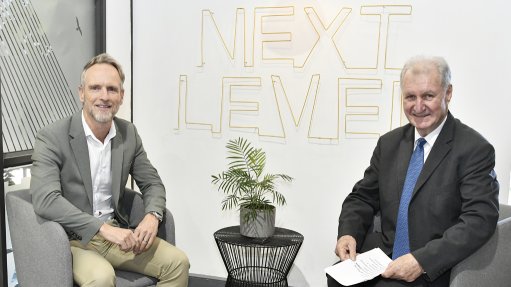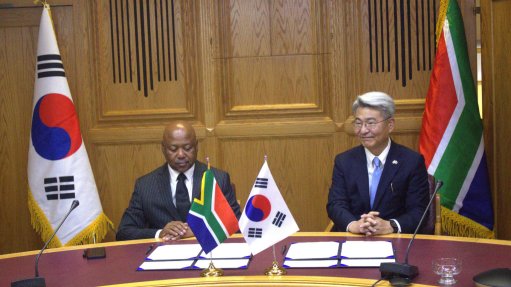Collaboration key to realising Africa’s green hydrogen economy potential
There is considerable potential for Africa to capitalise on the opportunities presented by the green hydrogen economy, and for South Africa to be the hub out of which this is done; however, a key requirement will be collaboration.
This was the key message from opening keynote speakers during the first day of the Hydrogen Africa Conference and Expo 2022, held in Sandton on September 28.
Sasol environmental VP Sarushen Pillay said it would be difficult, but possible, for South Africa to bolster its renewable energy and green hydrogen production capacity, with a considerable amount required to meet the country’s net-zero targets and build a sustainable mixed energy grid.
He pointed out that challenges to pursuing the green hydrogen economy include, in South Africa, the continued reliance on coal-fired power and the prohibitively high capital cost of hydrogen.
Therefore, he emphasised the need for collective action to overcome these challenges.
Pillay pointed out that, owing to the high costs, government funding and subsidies would be required. However, this was challenging in developing countries, with finances already constrained.
Therefore, he called for high-impact projects to be identified and funded.
Moreover, he said collective public-private partnerships would be the silver bullet to overcoming these challenges and advancing the green hydrogen economy.
He pointed out that the public sector was already aligning itself to this industry, with projects being pursued, along with the development of an enabling framework.
Pillay highlighted that there would be socioeconomic benefits from developing projects at scale, such as the Boegoebaai Port and Green Hydrogen Cluster, as long-term benefits would occur, including a considerable contribution to the country’s gross domestic product.
Further to collaboration, Pillay said a change of this nature would take time and perseverance. While there was an environmental impetus for the country to move with speed away from coal, he emphasised that this cannot be done abruptly, but, rather, must be done correctly, with proper steps over time in a sustainable manner.
Pillay also noted the need for brave, authentic and unwavering leadership, from both the public and private sectors in pursuing a green hydrogen economy.
He highlighted that there were several factors in South Africa’s favour, such as its excellent sun and wind resources, which European and Asian countries cannot replicate.
Therefore, the country must capitalise on this and develop projects and infrastructure for solar and wind energy, he said, with a critical mass of clean power able to open pathways for sustainable, green manufacturing.
He pointed out that this was only half of the solution, given that solar and wind energy were only available intermittently. Therefore, he said a balanced, low-emission grid was imperative to make South Africa a leader in the global green hydrogen economy.
Touching on the high costs, Pillay said costs would come down when technologies were scaled up; however, the country needed to act in the interim as well, through measures such policy intervention, grants and subsidies, besides others, to shift the green economy to more sustainable prices.
He also pointed out that there was potential for the country to become a hub for producing sustainable jet fuel, as it had the technology and expertise to do so.
Also delivering a keynote address was Chemical Industries Education and Training Authority CEO Yershen Pillay, who posited that the continent’s transition to green hydrogen must be led by South Africa.
He noted, however, that the industry was progressing faster than the legal and regulatory system.
Yershen Pillay also said that, given the country’s triple challenges of high inequality, poverty and unemployment, the green hydrogen economy must be undertaken in a way that addressed those challenges.
There was potential for this, he pointed out, with research showing that renewable energy had the potential to create more jobs than fossil fuels, and green hydrogen showing considerable potential for job creation.
He enthused that South Africa was well positioned to capitalise on the benefits provided by the green hydrogen economy, namely energy security, environmental benefits and lower future costs.
He emphasised that the country must intensify its efforts in several areas to exploit the full potential of this, namely, by investing in infrastructure, including pipelines at ports; more training and closing the skills gap; and investing more in research and development.
Yershen Pillay expounded that three core capabilities would be required. Firstly, he said businesses must invest in creating the required capacities and could not just add to existing business capabilities.
Further, he noted a need for strategic human resource, transformative and innovation capabilities.
Yershen Pillay also emphasised that small, medium-sized and microenterprises (SMMEs) must not be left behind, and in this vein, called for the country to set up a fund to assist SMMEs.
Moreover, he said the organisation was contributing to this by ensuring that a portion of the SMMEs it supports were in the hydrogen sector.
INTERNATIONAL COLLABORATION
Meanwhile, Australian Trade and Investment Commission Trade Commissioner Scott Morris informed that Australia’s vision was to create a competitive clean hydrogen industry that is a major global player by 2030.
As such, the country would be aiming to be a leader and adopt, develop and implement best practice globally.
He said Australia was an ideal partner for Africa, along with other international partners such as Japan, to provide lessons learned, advice, technology services and skills to help Africa become a green hydrogen powerhouse in its own right.
He echoed other speakers’ points that global demand for green hydrogen and ammonia meant that collaboration would be imperative.
Energy and Water Sector Education and Training Authority CEO Mpho Mookapele, meanwhile, called for capacity budling in terms of skills development. She pointed out that, often, training provided through sector education and training authorities and at universities was not up to par with what was needed in the industry and, therefore, there was a need for innovation and inclusivity.
She also pointed out that planning for skills in the country had become fragmented, and that this needed to be changed. There was also a need to develop the skills that were required in the coal industry, she pointed out, as this remained an important part of the country’s energy mix.
Meanwhile, pertinent points from a panel discussion included that there was a need for global agreements on core components in the industry, owing to there being many areas of opportunities, and therefore, in the short term, it was imperative that the building blocks were agreed on.
Also, it was noted that partnership models were important, as these presented countries with the natural resources for the industry, such as South Africa, with the opportunity to define the market and its conditions, rather than its development being undermined as had been the case previously with other industries.
Africa, therefore, can engage the industry not only as a supplier of products but can also use those products to add value and grow its economies.
Meanwhile, also presenting at the event, Siemens Middle East and Africa Mobility Turnkey CEO Ayman Ashour announced that the division would be launching a complete hydrogen initiative for the Africa and Middle East region in due course.
Article Enquiry
Email Article
Save Article
Feedback
To advertise email advertising@creamermedia.co.za or click here
Comments
Press Office
Announcements
What's On
Subscribe to improve your user experience...
Option 1 (equivalent of R125 a month):
Receive a weekly copy of Creamer Media's Engineering News & Mining Weekly magazine
(print copy for those in South Africa and e-magazine for those outside of South Africa)
Receive daily email newsletters
Access to full search results
Access archive of magazine back copies
Access to Projects in Progress
Access to ONE Research Report of your choice in PDF format
Option 2 (equivalent of R375 a month):
All benefits from Option 1
PLUS
Access to Creamer Media's Research Channel Africa for ALL Research Reports, in PDF format, on various industrial and mining sectors
including Electricity; Water; Energy Transition; Hydrogen; Roads, Rail and Ports; Coal; Gold; Platinum; Battery Metals; etc.
Already a subscriber?
Forgotten your password?
Receive weekly copy of Creamer Media's Engineering News & Mining Weekly magazine (print copy for those in South Africa and e-magazine for those outside of South Africa)
➕
Recieve daily email newsletters
➕
Access to full search results
➕
Access archive of magazine back copies
➕
Access to Projects in Progress
➕
Access to ONE Research Report of your choice in PDF format
RESEARCH CHANNEL AFRICA
R4500 (equivalent of R375 a month)
SUBSCRIBEAll benefits from Option 1
➕
Access to Creamer Media's Research Channel Africa for ALL Research Reports on various industrial and mining sectors, in PDF format, including on:
Electricity
➕
Water
➕
Energy Transition
➕
Hydrogen
➕
Roads, Rail and Ports
➕
Coal
➕
Gold
➕
Platinum
➕
Battery Metals
➕
etc.
Receive all benefits from Option 1 or Option 2 delivered to numerous people at your company
➕
Multiple User names and Passwords for simultaneous log-ins
➕
Intranet integration access to all in your organisation


















